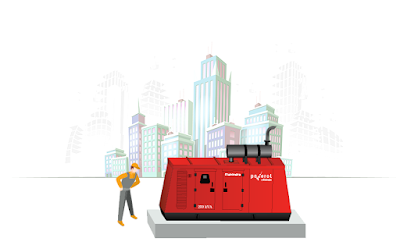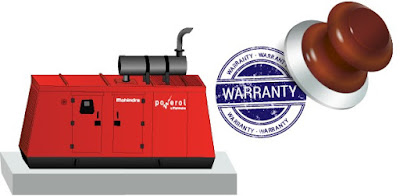1.WHAT IS YOUR POWER REQUIREMENT?
Calculating the power requirement and then determining
the suitable rating of generator you need is called as Generator Sizing.
This is the most important factor to consider before you decide to buy a generator.
The determining factor for generator sizing can be
answered by considering the followings:
§ In the
event of a power outage, should the generator
run the entire building or just emergency loads?
§ What will
be the peak demands during summer months?
§ If you have
Motors, Compressors etc, what will be your starting load?
After you have considered the above, you need to
identify your electrical equipment (electrical load) and sum up their power
requirements. This process is also called as Load Calculation. There are
many free ‘Load
Calculators’ available on the internet. You may take help from a certified
electrician. If you are not sure, take help from our sales representatives,
they will be happy to help – it is FREE for you!!
2. WHERE
WILL YOU PLACE THE GENSET?
The genset should be
located where it is accessible for maintenance and repair, and high enough to
keep the generator safe if there is water logging during monsoon. There
should be enough air flow to let the generator breath properly.
Factors like minimum distance from residential
buildings, silence zone near hospitals, fire hazards etc. should be considered.
Compliance with local guidelines is a must.
The most common fuel types for generators
in India are Natural Gas and Diesel. Cost can be a factor when choosing between
a diesel or natural gas generator.
In case of natural
gas, the availability of the fuel source is important.
Local government regulations may dictate which fuel
types are available to your area.
4. WHO WILL BE INSTALLING YOUR GENSET?
Only a competent, experienced and certified authority
should do the installation.You may choose the right agency through your trusted
referrals.
We have trained technicians to do this job. You may
contact our representatives for more information, they will be happy to help
you.
5. HAVE
YOU PLANNED FOR THE FOUNDATION?
Before the
generator
arrives at your premises, a cement concrete foundation of adequate size should
be made ready. An inadequate foundation may lead to excessive vibration
resulting in poor performance of your generator.
Only a competent and experienced authority should make
the foundation for your generator.You can consult our representatives for any support and
guidance, they will be happy to help you.
6. WHAT TYPE OF ENCLOSURE TO CHOOSE?
Most generator manufacturer’s make generators
with a standard sound attenuated enclosure (which reduces the sound level). The
sound level will be around 74 db (to meet standard CPCB compliance).
Some area may have a regulation of minimum allowed decibel level.
For example, places near hospitals, VIP zones, silent zone, airports etc. The
target sound level will determine what type of generator enclosure you need to
consider.
We also offer Super Silent (54 db) variants of generators to
suite your needs.
7. WHO
WILL DO THE MAINTENANCE?
A Diesel Generator
or a Gas
Generator needs maintenance. Unlike a car, generators are often neglected.
To ensure that the generator runs during a power failure when you need it the
most, proper maintenance routine should be followed.
Every genset
manufacturer will recommend a maintenance schedule and it must be done.
Most of the modern
generators are electronically controlled. Maintenance is not restricted to only
Oil, Coolant and Filter change. A maintenance DIY for these generators is not a
good idea.
It is best to
have a maintenance contract with the manufacturer.
8. HAVE YOU THOUGHT OF THE TRANSFER SWITCH?
Do you need a
Transfer Switch?
If you want to power
just one AC and few lights you may use a power cord connecting the generator
and the appliances. For small generators
powering small loads this is a common scenario, you do not need a Transfer
Switch in such cases.
When you have larger
loads and your loads are connected to an existing power panel then you will
need a Transfer
Switch. The Transfer switch is the link between the power panel and the
generator.
Will you use the
generator only for emergency loads or for every load you have. This will
determine the ampere rating and design of the Transfer Switch. You can choose a
manual Transfer Switch or an Automatic Transfer Switch (costs more).
9. WHAT TYPE ACCESSORY YOU NEED
You may need some
special features which does not come as a standard fitment with the generators.We offer Remote Monitoring
System and Battery Charger as optional fitment.To run the
generators in extreme cold weather you may need a Cold Starting arrangement.
We also provide
fully customized solutions. For details, please get in touch with our
representatives, they will be happy to help you.
NOTE: Powerol
generator do not need additional cold starting kit. Our generators are engineered
to run for every weather condition within India.
10. WARRANTY AND ANY ADDITIONAL COVERAGE
The standard warranty
for generator systems typically ranges from two to five years.
It’s a good idea to
understand the warranty duration and coverage of your generator and ask for
upgrade costs if you prefer an increased coverage.
We offer special
maintenance packages to suit your needs.To know more about
our products visit us at www.mahindrapowerol.com
or call us at 1800-419-1999











Decent blog !! A debt of gratitude is in order for sharing important information. if you are looking diesel generator for office at that point click the best generator vendor in Bangladesh at reasonable Price.
ReplyDeleteGenerator suppliers
ReplyDeleteThis article is amazing. It helped me a lot. Sir, keep up the good work. We are always with you and look forward to your new interesting articles.
Also, please check https://inverterreview.com/duromax-xp4850hx-dual-fuel-generator/ as well.
ReplyDelete